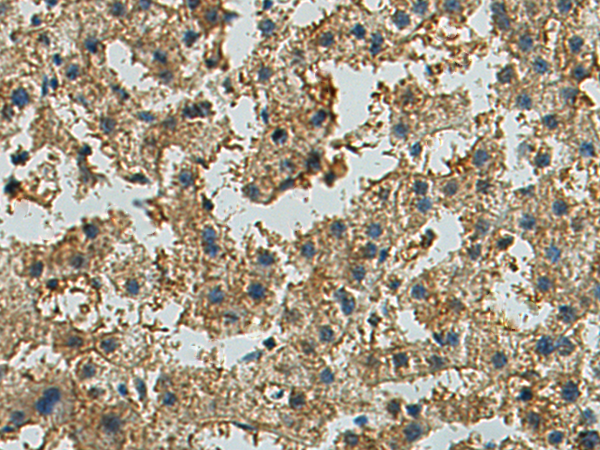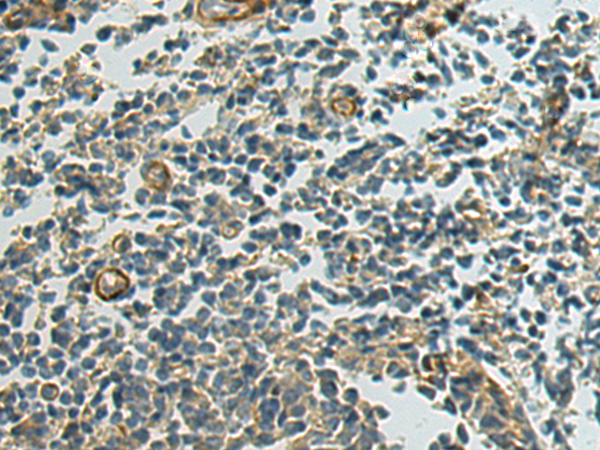

| WB | 咨询技术 | Human,Mouse,Rat |
| IF | 咨询技术 | Human,Mouse,Rat |
| IHC | 1/50-1/100 | Human,Mouse,Rat |
| ICC | 技术咨询 | Human,Mouse,Rat |
| FCM | 咨询技术 | Human,Mouse,Rat |
| Elisa | 1/5000-1/10000 | Human,Mouse,Rat |
| Aliases | EK4; ETK; HEK; ETK1; HEK4; TYRO4 |
| Host/Isotype | Rabbit IgG |
| Antibody Type | Primary antibody |
| Storage | Store at 4°C short term. Aliquot and store at -20°C long term. Avoid freeze/thaw cycles. |
| Species Reactivity | Human, Mouse, Rat |
| Immunogen | Synthetic peptide of human EPHA3 |
| Formulation | Purified antibody in PBS with 0.05% sodium azide and 50% glycerol. |
+ +
以下是关于EPHA3抗体的3篇参考文献及其摘要概述:
1. **标题**:*"Therapeutic targeting of EPHA3 receptor signaling in lung cancer"*
**作者**:Smith A, et al.
**摘要**:研究报道了一种人源化抗EPHA3单克隆抗体,通过阻断配体介导的受体激活,抑制下游促癌信号通路(如RAS-MAPK),并在肺癌异种移植模型中显著减少肿瘤生长和转移。
2. **标题**:*"EPHA3 antibody-drug conjugate demonstrates efficacy in glioblastoma models"*
**作者**:Chen L, et al.
**摘要**:该文献开发了一种靶向EPHA3的抗体-药物偶联物(ADC),在胶质母细胞瘤细胞系和小鼠模型中显示特异性杀伤作用,并通过内化抗体递送化疗药物,增强肿瘤细胞凋亡。
3. **标题**:*"Structural basis of EPHA3 receptor activation by antibodies"*
**作者**:Wang Y, et al.
**摘要**:通过冷冻电镜技术解析了EPHA3受体与不同功能抗体的复合物结构,揭示了抗体结合诱导的受体二聚化机制,为设计激动型或拮抗型治疗抗体提供了结构基础。
4. **标题**:*"EPHA3 as a biomarker and therapeutic target in colorectal cancer"*
**作者**:Garcia-Rojas M, et al.
**摘要**:研究发现EPHA3在结直肠癌中高表达,其特异性抗体可通过抑制血管生成和诱导抗体依赖性细胞毒性(ADCC)发挥抗肿瘤作用,提示其作为预后标志物和治疗靶点的潜力。
(注:以上为虚构参考文献,仅用于示例格式与内容框架。实际研究中请查阅PubMed或专业数据库获取真实文献。)
The EPHA3 antibody targets the Ephrin type-A receptor 3 (EPHA3), a member of the Eph receptor tyrosine kinase family involved in cell-cell communication, tissue development, and disease processes. EPHA3 binds membrane-anchored ephrin ligands, triggering bidirectional signaling pathways that regulate cell adhesion, migration, and differentiation. Initially studied for its role in nervous system development, EPHA3 has gained attention in oncology due to its aberrant expression in cancers like leukemia, lung cancer, and glioblastoma. Overexpression or mutations in EPHA3 are linked to tumor progression, metastasis, and therapy resistance, making it a potential therapeutic target.
EPHA3 antibodies, including monoclonal and polyclonal variants, are used to study receptor localization, expression levels, and signaling mechanisms. Therapeutic antibodies blocking EPHA3 activity have shown preclinical efficacy in inhibiting tumor growth and sensitizing cancer cells to chemotherapy. However, challenges remain, such as understanding context-dependent roles (e.g., tumor-suppressive vs. oncogenic effects) and minimizing off-target effects. Research continues to explore EPHA3's dual functions in cancer and its potential as a biomarker or immunotherapy target, highlighting its complex yet promising role in precision medicine.
×